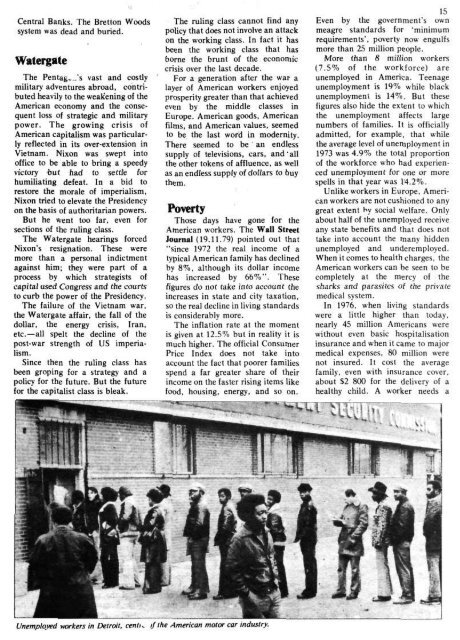Inqaba ya basebenzi Number 2 April 1981 - DISA
Inqaba ya basebenzi Number 2 April 1981 - DISA
Inqaba ya basebenzi Number 2 April 1981 - DISA
You also want an ePaper? Increase the reach of your titles
YUMPU automatically turns print PDFs into web optimized ePapers that Google loves.
Central Banks. The Bretton Woods<br />
system was dead and buried.<br />
Watergate<br />
The Pentag "s vast and costly<br />
military adventures abroad, contributed<br />
heavily to the weakening of the<br />
American economy and the consequent<br />
loss of strategic and military<br />
power. The growing crisis of<br />
American capitalism was particularly<br />
reflected in its over-extension in<br />
Vietnam. Nixon was swept into<br />
office to be able to bring a speedy<br />
victory but had to settle for<br />
humiliating defeat. In a bid to<br />
restore the morale of imperialism,<br />
Nixon tried to elevate the Presidency<br />
on the basis of authoritarian powers.<br />
But he went too far, even for<br />
sections of the ruling class.<br />
The Watergate hearings forced<br />
Nixon's resignation. These were<br />
more than a personal indictment<br />
against him; they were part of a<br />
process by which strategists of<br />
capital used Congress and the courts<br />
to curb the power of the Presidency.<br />
The failure of the Vietnam war,<br />
the Watergate affair, the fall of the<br />
dollar, the energy crisis, Iran,<br />
etc.—all spelt the decline of the<br />
post-war strength of US imperialism.<br />
Since then the ruling class has<br />
been groping for a strategy and a<br />
policy for the future. But the future<br />
for the capitalist class is bleak.<br />
The ruling class cannot find any<br />
policy that does not involve an attack<br />
on the working class. In fact it has<br />
been the working class that has<br />
borne the brunt of the economic<br />
crisis over the last decade.<br />
For a generation after the war a<br />
layer of American workers enjoyed<br />
prosperity greater than that achieved<br />
even by the middle classes in<br />
Europe. American goods, American<br />
films, and American values, seemed<br />
to be the last word in modernity.<br />
There seemed to be ' an endless<br />
supply of televisions, cars, and'all<br />
the other tokens of affluence, as well<br />
as an endless supply of dollars to buy<br />
them.<br />
Poverty<br />
Those days have gone for the<br />
American workers. The Wall Street<br />
Journal (19.11.79) pointed out that<br />
"since 1972 the real income of a<br />
typical American family has declined<br />
by 8%, although its dollar income<br />
has increased by 66%". These<br />
figures do not take into account the<br />
increases in state and city taxation,<br />
so the real decline in living standards<br />
is considerably more.<br />
The inflation rate at the moment<br />
is given at 12.5% but in reality it is<br />
much higher. The official Consumer<br />
Price Index does not take into<br />
account the fact that poorer families<br />
spend a far greater share of their<br />
income on the faster rising items like<br />
Unemployed workers in Detroit, centi. if the American motor car industry.<br />
15<br />
Even by the government's own<br />
meagre standards for 'minimum<br />
requirements', poverty now engulfs<br />
more than 25 million people.<br />
More than 8 million workers<br />
(7.5% of the workforce) are<br />
unemployed in America. Teenage<br />
unemployment is 19% while black<br />
unemployment is 14%. But these<br />
figures also hide the extent to which<br />
the unemployment affects large<br />
numbers of families. It is officially<br />
admitted, for example, that while<br />
the average level of unemployment in<br />
1973 was 4.9% the total proportion<br />
of the workforce who had experienced<br />
unemployment for one or more<br />
spells in that year was 14.2%.<br />
Unlike workers in Europe. American<br />
workers are not cushioned to any<br />
great extent Hy social welfare. Only<br />
about half of the unemployed receive<br />
any state benefits and that does not<br />
take into account the many hidden<br />
unemployed and underemployed.<br />
When it comes to health charges, the<br />
American workers can be seen to be<br />
completely at the mercy of the<br />
sharks and parasites of the private<br />
medical system.<br />
In 1976. when living standards<br />
were a little higher than today,<br />
nearly 45 million Americans were<br />
without even basic hospitalisation<br />
insurance and when it came to major<br />
medical expenses. 80 million were<br />
not insured. It cost the average<br />
family* even with insurance cover,<br />
about $2 800 for the delivery of a<br />
food, housing, energy, and so on, healthy child. A worker needs a
















